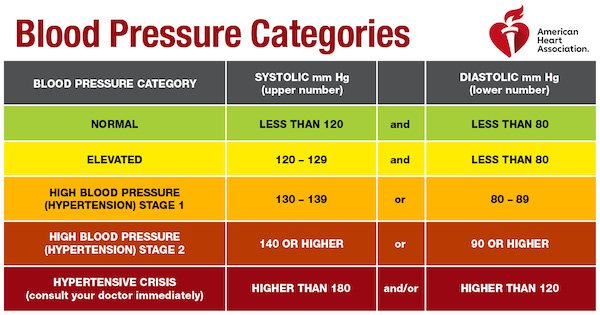What causes high blood pressure?
About 85 million people in the United States have high blood pressure. When it’s high, it means blood is flowing through the arteries at a higher than normal pressure. As it flows, it exerts force against the artery walls.
The American Heart Association has a whole list of things that can cause a rise in blood pressure.
Risk factors you can change:
- Lack of physical activity
- An unhealthy diet, especially if high in sodium
- Obesity
- Overuse of alcohol
- Smoking
- Stress overload
Risk factors you can’t change:
- Family history
- Parents or other close relatives with high blood pressure
- Age
- The older you are, the greater the risk
- Gender
- Until 45, men are at greater risk
- 45 to 64, equal risk
- 65 and older, women are at greater risk
- Race
- African-Americans have an increased risk
What is normal, and what is not?
This is a common blood pressure reading: 120/80.
The number on the left is systolic pressure or blood pressure when the heart is beating.
The number on the right is diastolic pressure or blood pressure when the heart is at rest between beats.
Below is a chart from the American Heart Association that shows several different blood pressure levels and what they mean.

What can happen if you have high blood pressure?
High blood pressure puts you at risk of developing several serious health problems, including a heart attack or stroke.

How to lower your blood pressure
When you have prehypertension (or for some people in Stage I,) lifestyle changes can go a long way toward lowering blood pressure. Dr. Brandei Wingard, a cardiologist with Northern Light Mercy Cardiovascular Care in Portland, Maine has these recommendations:
- Reduce the salt in your diet
- Exercise regularly
- Aim for a BMI (body mass index) of 25 or less
- Don’t know your BMI? Use this calculator.
When you’re consistently at Stage 2, your doctor may suggest medication along with lifestyle changes.
If your blood pressure gets higher than 180/110 it’s considered a crisis. Here’s what the heart association says you should do:
If your blood pressure is higher than 180/110 mm Hg and you are NOT experiencing symptoms such as chest pain, shortness of breath, back pain, numbness/weakness, changes in vision or difficulty speaking, wait about five minutes and take it again. If the reading is still at or above that level, you should CALL 9-1-1 and get help immediately.
For more information about blood pressure, visit the American Heart Association.

I love your infographic, it’s very effective visual. I really like your topic too because I’m a caregiver of my father whose high blood pressure for many years. Keep writing, thanks!
I have been fighting high blood pressure since right before I found 0ut that I needed my thyroid removed. Everything seemed okay until they had to adjust my thyroid meds. I am on Lostan which is giving me some side effects that are quite bothersome. Blood pressure yesterday while at the doctor was 160\100 which didnt seem to bother my doctor but instead doubled my meds, 25 mg in the am and 25 in the pm. i do have anxiety issues and my doctor put me on two 0.25 mg a day. I get anxiety issues quite easily. ]Losartan is the med}. I recently had a 5 hour back surgery and now have a collapsed lung and paralized diaphram whichn makes it hard to breath with exertion. I use to walk 3 to 5 miles daily and am unable to do that now. now with the weather getting nicer I hope tp go at least a mile. Have to wear a mask to keep the cold air out of my mouth. What can I do?